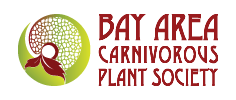Bay Area Carnivorous Plant Society
The Bay Area Carnivorous Plant Society (BACPS) began in 1988 as an informal get-together between friends and enthusiasts of carnivorous plants. Chuck Powell II, Peter D’Amato, Joe Mazrimas and Judith Finn held meetings in their homes, California Carnivores, and at UC Botanical Garden. By 1992, Wayland Lee created the first BACPS logo, Geoff Wong drafted the first newsletter, BACPS held its first formal meeting, the first bylaws were created, and a schedule was established to hold four seasonal meetings annually.
Later that same year and with 60 members in attendance, the board was created and Carl Wong was elected the first President, with Chuck Powell as Vice President, Larry Logoteta as Secretary, and Joe Mazrimas as Treasurer. And in 1998, Peter D’Amato wrote the quintessential carnivorous plant grower’s guide, The Savage Garden, which to this day, inspires the many luminaries who have and will eventually cultivate, research, explore, and document some of the most fascinating members of the plant kingdom.
2024 Board

President Zach Lim
Just over 20 years ago, a young Zach Lim served as the Randall Museum’s liaison for the BACPS. Fast forward to present day, and he is now not only the Director of Animal Exhibits at the Randall but also the newest BACPS President.
After a 15+ year hiatus from growing carnivorous plants, he resumed the hobby in 2020 and joined the board as Secretary. While in this position, Zach was able to learn the ins and outs of setting up meetings, securing speakers, vendors, and organic community growth. He looks forward to fostering connections between the casual carnivorous plant lover, established sellers, and those who have dedicated their lives to researching these species.
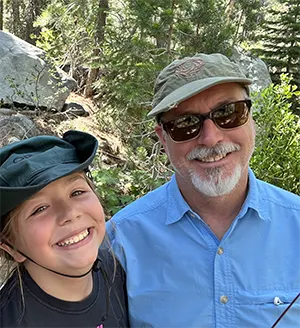
Vice President Laurence Frabotta
A lifelong passion for all things nature was clear when, to a 3rd Grade prompt, “What do you want to be when you grow up?” our new BACPS Vice President, Laurence Frabotta replied, “An Ologist!” It was clear, Laurence was destined to become a scientist of some sort and like many grade schoolers, he killed his fair share of “death cube” Venus Flytraps.
As a college student with visions of becoming a physician, he moved from one job to another (waiter, salesman (shoes to wire products), theater and film production crew) and was caught by the research bug that allowed him explore a passion for reptiles. As a student at CSU Long Beach studying native California lizards and developing skills in phylogenetics and taxonomy, he kept a few African sundews along with dozens of cacti and succulents as a distraction.
Grad school and postdoctoral research led Laurence and his wife, Colleen (a BACPS member and fellow biologist) across the country to Texas, then NYC, Charlottesville, and eventually landing back in California after a 20-year hiatus. The move back to the climate of coastal California in 2019, awakened a passion for growing plants including carnivores – initially a few Drosera, VFTs, and Nepenthes, Laurence was introduced to BACPS by a member and promptly joined the Society.
In 2021, a neighbor gave him his first Ping leaf-pulls and that opened a floodgate. Laurence now focuses substantial attention to growing, breeding, and trading Mexican Pinguicula, curates a Mexican Ping hybrid/cultivar database, and plans to tackle the molecular phylogenetics of the problematic P moranensis species complex with students at San Francisco State University where he is a Senior Lecturer of Biology.
Laurence brings to BACPS regional and national nonprofit board experience, particularly in strategic planning, education, outreach, fundraising, and resource development.
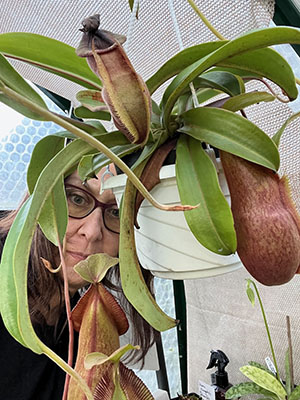
Treasurer Kat Cascone
I first became interested in CPs when I was very young and a friend had a Venus Flytrap that I was insanely jealous of—but they weren’t easy to come by back then! It wasn’t until years later I bought my young son a VFT, though we made the typical beginner’s mistake of thinking it died when it went dormant. Undeterred, we bought some sarracenias from California Carnivores. We were captivated by their strangeness and beauty. Fast forward about 25 years and now we have a small greenhouse full of Nepenthes (our main obsession) and bunches of Sarrs, a few pings, Drosera, VFTs—a bit of everything. We discovered BACPS many years ago and were on again-off again members for a while—definitely on-again these last few years.
When I’m not in my greenhouse gazing at the plants, I can be found managing a team of designers at a consultancy called SYPartners, practicing or teaching yoga, dancing ballet, gardening or reading books. In a past life, I ran a small business with my musician husband—a record label and distribution service where I was the Chief Financial Officer and Art Director.
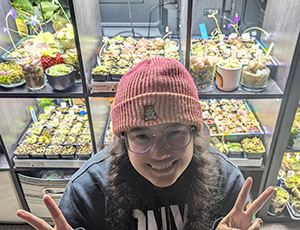
Secretary Kathryn Churchill
I went to my first BACPS Show & Sale back in 2014 on a whim. I got a bunch of temperates, and like Kat Cascone, made the rookie mistakes. These are houseplants right? I definitely let them dry out between waterings on a very shaded balcony.
Fast forward to 2018, I officially start my houseplant journey. One of my favorite places to wander was the collection of greenhouses off 92. I impulse bought a bunch of carnivores I knew nothing about but found a bunch of like minded individuals in several facebook groups. And that was game over for me.
I started helping BACPS with social media in 2022, and this year as a board member, I hope to help bring more online content and create more community engagement. I would love to grow our repository of amazing pictures from the community to share and pine over, create care tutorials on youtube with our members, and help 2022 BACPS President Stephen Davis fulfill some of his goals of engaging with Bay Area schools and getting kids excited about these weird plants! Be on the look out for future emails from me for help with growing our content libraries and BACPS community :)
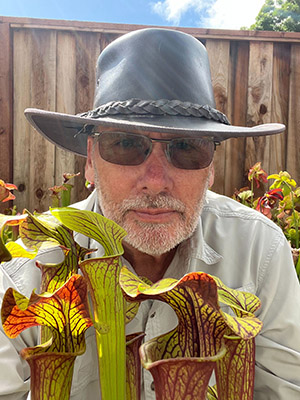
Grunt Stephen Davis
I saw my first carnivorous plant in the wild while canoeing on a lake in the Adirondack Mountains in upstate New York. It was probably Drosera anglica and it was perched on a stick reflecting perfectly on the water beneath it. I was awed but didn’t yet know that I had started on a long and wonderful journey. Years later I was in Napa and found this little nursery called California Carnivores conveniently located next to a winery. There I met Peter D’Amato who talked me into my first Sarracenia and Drosera capensis. To this day D. capensis is one of my favorite plants.
Not long after that I stumbled on a sale that the BACPS was holding and started making friends. The BACPS and the carnivorous plant community was a warm and sharing group where I met and friended many people that happily coached me on growing these plants. I started to get involved with the BACPS in small ways but attended every meeting. As time went on I got more involved., I helped a little with the ICPS conference in San Francisco in 2000. I entered a couple of plants in the first “Show” that Geoff Wong organized at California Carnivores. I got very involved the following year with the show as we grew it from a few 8-foot tables into what was for years the largest carnivorous plant show and sale in the USA complete with ribbons, prizes, and vendors.
Somewhere in this I became BACPS Vice President for a year or two and then President for a few years. During that time I focused on communications and moved us from a printed newsletter sent in the mail to an email newsletter. This was something that was much harder than I expected. Years later I worked on getting us represented on Facebook and other social media. I was almost always on the board and continued to be heavily involved in the Show and Sale. I was lucky to have worked on the committee for the 2018 ICPS conference and the second hosted by the BACPS.
A few years ago I became President again just in time for COVID. This was a very challenging time for the BACPS and I’m proud of how the team that we put together not only got the club through the pandemic, but we made it a better and much more active organization than it has ever been. Now we had speakers from all over the world presenting research and sharing adventures with our members and Zoom attendees from around the globe. When restrictions started to be lifted we navigated around the challenges of holding a show and sale that required everyone to sign waivers, wear masks and for the first time be entirely outdoors. None of our old haunts could host us anymore so we found new places to meet and met more often in “pop-up” meetings as well as more formal and traditional ones.
When it comes to my collection, I guess my focus is on Sarracenia, Drosera, and Pinguicula. However, I don’t have a favorite plant anymore and I grow almost all the genera. I have really enjoyed giving presentations to schools, clubs, and libraries around the Bay Area. I sell plants and have almost always had a table at the show and sale which has often been staffed by my wife and daughter. My favorite contribution to the carnivorous plant community was having been with Dr. Barry Rice when he solved the 100-year-old mystery of the pollinator of the Darlingtonia. I like to say that I navigated and financed the expedition which means I drove and paid for the gas.

Show Wizard James Fong
James has been growing carnivorous plants in the Bay Area for over 15 years. He enjoys filling every space in the house with carnivorous plants. He grows most genera of carnivorous plants and loves experimenting with new cultivation techniques. He also enjoys finding carnivorous plants in their natural habitats. Some fun things he has found are Drosera rotundifolia in Alaska, Pinguicula involuta in Peru, and Drosophyllum lusitanicum in Portugal. James believes it is essential for hobbyists to understand the value of these unique organisms in their natural habitats and that we must all play a part in educating the public to ensure their conservation.
James started going to BACPS meetings when he was in middle school and has enjoyed playing a larger role in the community. He was Vice President from 2020 through 2022. As Vice President, James was tasked with running the annual show and sale as well as coordinating meetings. When everything shut down due to COVID, we had to make big changes to how BACPS operated. We started hosting our meetings virtually and ended up doing a BIG virtual show and sale! As things started opening back up, we transitioned back to having in person meetings. We also moved the Show and Sale to Saint Joseph Notre Dame High School where it’s mostly outdoors and is more spacious than our previous venue. This way we could host more vendors as well as more attendees with the ever growing Bay Area carnivorous plant community. Every year the BACPS Annual Show and Sale gets bigger and better and he is excited to see how this event continues to grow!

